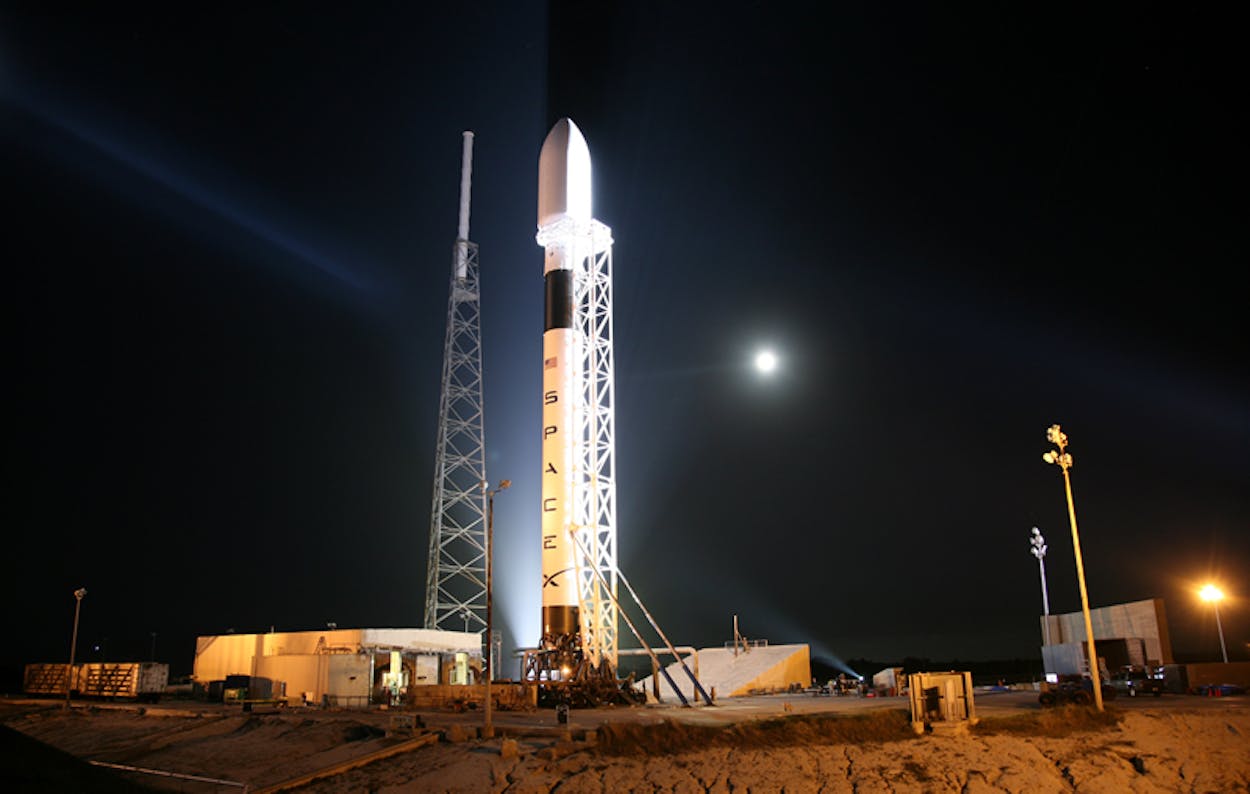The man who brought the world PayPal and Tesla Motors is still going full throttle when it comes to innovation for the future, and his next stop may be Texas.
As Jon Stewart recently pointed out, Elon Musk’s CEO of Space Exploration Techonology Corp. (SpaceX) is one of four entities to have created a rocket, launched the rocket into orbit, and brought it back safely to earth. (The other three entities? the United States, China, and the Soviet Union.) And now, some good news for Texas, a state still smarting from the end of the Shuttle program: a piece of land in Brownsville is on SpaceX’s radar as a possible site for a new, “commercial Cape Canaveral.”
In 2008, the California-based company won a $1.6 billion contract with NASA as part of a program allowing private firms to take over ferrying goods to the International Space Station, a role previously performed by the Space Shuttle. NASA selected SpaceX’s Falcon 9 rocket and the Dragon capsule to perform this function. In 2010, the company became the first private organization to successfully launch and retrieve a spacecraft. Now, on April 30, the Dragon is slated to become the first private American vehicle to go on a mission to the ISS.
About forty percent of SpaceX’s business comes from NASA, and demand for the rocket company’s product is growing in the private sector. Last November, Musk announced that his company was considering several locations in the U.S. to become the site of a new commercial launch facility. One such option was in Cameron County. Then, last week, the Federal Aviation Administration released a “Notice of Intent to Prepare an Environmental Impact Statement,” which will outline the effects of bringing such a facility to Brownsville, which leads many to believe that SpaceX is seriously considering the land near the Gulf of Mexico.
SpaceX spokeswoman Kristin Grantham was tight lipped about “whether the company had zeroed in on Texas as the site of its proposed commercial launch facility” Dan Leone wrote in Space News. “The Brownsville area is one of the possibilities, but there is a long way to go before this could happen,” Grantham said.
The FAA’s study alone could take anywhere between nine months and several years to complete, and will cost thousands of dollars, the Brownsville Herald reported last week. The FAA will need to look at the potential damages to wildlife and the environment. Local officials believe that sea turtles, snakes, and sandpipers are most at risk. The privately-owned land is “nothing but a grassy field with lots of sand,” which is why SpaceX wants it, according to Gilbert Salinas, executive vice president of the Brownsville Economic Development Council. “They know no one else would be interested in building in the area,” Salinas told the Herald.
The study will not explore how the lives of local residents will be impacted, and some who spoke with the Herald were “not too thrilled” about the prospect of a facility that would disrupt the peacefulness of the beach where they have made their homes.
But Cameron County Precinct 1 Commissioner Sofia C. Benavides thinks the launch pad would “be good for jobs and will provide educational opportunities for youth.” (Experts estimate that the number of jobs the SpaceX facility could bring to the area could number anywhere from 100 to the thousands.) The potential fame Brownsville could amass is another possible benefit, at least for Salinas. “I think closing the beach for a few hours (per launch) is a small sacrifice for literally putting Brownsville on the globe,” he said.
WATCH Elon Musk talk about SpaceX with Jon Stewart on The Daily Show here:






